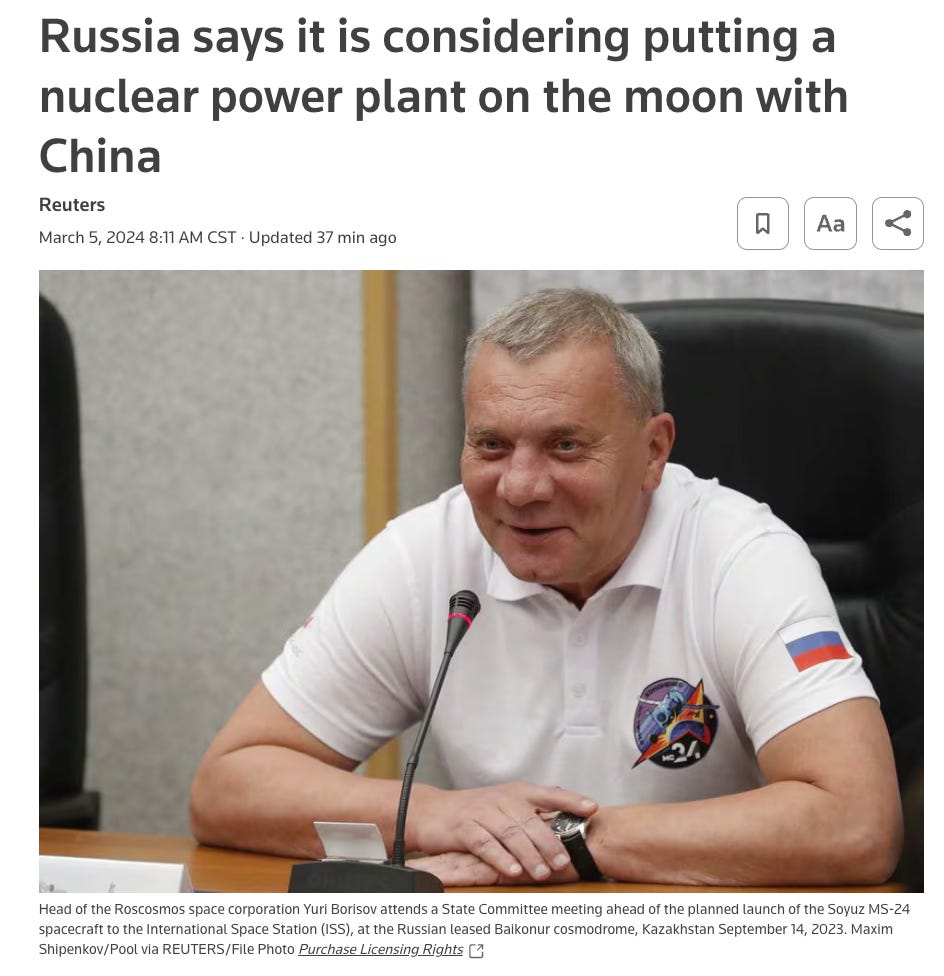Sino-Ru Leaps Toward the Future; US stuck on Earth
Setting up a future space race is exactly what and where the US needs to be to push America forward ....
BY ML SHAW
In a groundbreaking move, Russia and China have announced plans to explore the possibility of placing a nuclear power plant on the moon by 2033-35. Yuri Borisov, head of Russia's space agency Roscosmos, highlighted the potential of such a venture, emphasizing the role of nuclear energy in powering future lunar settlements. The project, undertaken in collaboration with Chinese counterparts, represents a significant step forward in humanity's quest to expand beyond Earth's confines.
The proposed nuclear power plant addresses a critical challenge for sustained human presence on the moon. Unlike solar panels, which may not provide sufficient electricity for lunar settlements, nuclear power offers a reliable and continuous energy source, essential for supporting life and facilitating scientific endeavors in the harsh lunar environment.
Borisov's remarks hint at broader ambitions, including the development of a nuclear-powered cargo spaceship capable of transporting large payloads and addressing space debris—a pressing concern for space exploration.
While Russia has encountered setbacks in its lunar missions, including the recent failure of the Luna-25 spacecraft, the partnership with China signals a renewed commitment to lunar exploration and eventual colonization. China's stated goal of sending its first astronaut to the moon before 2030 underscores the shared vision of expanding human presence beyond Earth.
Critics may raise concerns about the militarization of space, particularly in light of recent geopolitical tensions. However, framing this development as a catalyst for encouraging the United States to prioritize long-term space exploration offers a compelling perspective.
The prospect of Russia and China advancing nuclear power in space should prompt the United States to reevaluate its stance on space exploration. Historically, competition has driven progress in space exploration, from the space race of the Cold War era to recent innovations in commercial spaceflight.
We cannot let the ubēr-progréssives (hard leftists) keep us dreamily gazing up at the stars complaining about sissified “militarization” of space. The dead fact of historical progress is written by one of three powers. Money, Military or Resources (food too). Sometimes all three. Typically, whoever wins, carries with them and impresses their core principles on the world. Russia and China understand this tacitly. The United States used too.
By embracing the challenge posed by Russia and China's ambitious plans, the United States can galvanize efforts to establish sustainable human habitats on celestial bodies, paving the way for a future where humanity thrives beyond Earth's borders. This necessitates long-term investment in technology, infrastructure, and international collaboration.
Russia and China's initiative to explore nuclear power on the moon heralds a new era of space exploration, exploitation and colonization. Rather than viewing it through the lens of rivalry, the United States should seize this opportunity to refocus its efforts on advancing human presence in space, ensuring a brighter future for generations to come. America needs to get serious about nuclear-powered long-term human or automatons on and in severely austere non-terrestrial environments.
sources:
Ground News - Russia and China are considering putting a nuclear power unit on the Moon -RIA
https://ground.news/article/russia-and-china-are-considering-putting-a-nuclear-power-unit-on-the-moon-ria_d7f60f
Russia says it is considering putting a nuclear power plant on the moon with China | Reuters
https://www.reuters.com/technology/space/russia-china-are-considering-putting-nuclear-power-unit-moon-ria-2024-03-05/?utm_source=ground.news&utm_medium=referral
Russia and China are considering putting a nuclear power unit on the Moon – RIA | World News - The Indian Express
https://indianexpress.com/article/world/russia-china-putting-nuclear-power-unit-moon-ria-9197288/?utm_source=ground.news&utm_medium=referral
Russia, China consider putting nuclear power reactor on Moon in 2033-2035 — Roscosmos - Science & Space - TASS
https://tass.com/science/1755793?utm_source=ground.news&utm_medium=referral



